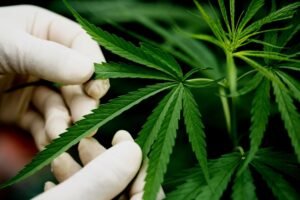CBD Oil for Anxiety Research and Clinical Studies: What Science Says
With anxiety disorders affecting over 40 million adults in the U.S. alone, there’s growing interest in CBD oil for anxiety research. Cannabidiol (CBD),…
Table of contents
With anxiety disorders affecting over 40 million adults in the U.S. alone, there’s growing interest in CBD oil for anxiety research. Cannabidiol (CBD), a non-psychoactive compound derived from hemp, has shown promise in preclinical models and human trials for easing anxiety symptoms. In this comprehensive guide, we’ll explore the latest studies, clinical evidence, mechanisms of action, safety profiles, and future directions—so you can separate hype from hope when considering CBD oil for anxiety relief.
Understanding Anxiety and the Need for New Treatments
Anxiety disorders—ranging from generalized anxiety (GAD) to social anxiety disorder (SAD), panic disorder, and PTSD—can severely impair daily functioning. While selective serotonin reuptake inhibitors (SSRIs) and cognitive-behavioral therapy are first-line treatments, up to 30% of patients don’t respond adequately. This treatment gap has spurred interest in CBD oil for anxiety research and its potential as an adjunct or alternative therapy.
Preclinical Evidence: Animal and Cellular Studies
1. Rodent Models of Anxiety
- Elevated Plus Maze & Open Field Tests: Rats given CBD displayed increased exploration of open arms and central zones—indicators of reduced anxiety.
- Dose-Response: Low to moderate CBD doses (1–10 mg/kg) yielded anxiolytic effects, while higher doses sometimes lost efficacy, suggesting an inverted U-shaped curve.
2. Mechanistic Insights
- Serotonin Receptors (5-HT₁A): CBD acts as a partial agonist, enhancing serotonin signaling known to regulate mood and anxiety.
- Endocannabinoid System: CBD inhibits FAAH, raising anandamide levels and indirectly modulating CB₁ receptors involved in stress response.
- Neuroinflammation: Anti-inflammatory effects of CBD may reduce neuroinflammatory markers linked to anxiety and depression.
These preclinical findings laid the groundwork for human trials of CBD oil for anxiety research.
Human Clinical Studies
1. Social Anxiety Disorder (SAD)
- 2009 Public Speaking Trial: In a double-blind study, 24 patients with SAD received 600 mg CBD or placebo before a simulated public speaking test. Those on CBD reported significantly reduced anxiety, cognitive impairment, and discomfort in speech performance.
2. Generalized Anxiety Disorder (GAD)
- 2011 Case Series: Five patients with treatment-resistant GAD or panic disorder were given 25 mg/day CBD. Four out of five showed marked reductions in anxiety scores over 12 weeks, though sample size was small.
3. Post-Traumatic Stress Disorder (PTSD)
- 2020 Open-Label Study: 11 veterans with PTSD received 33–50 mg/day CBD as adjunctive therapy for eight weeks. Participants reported decreased PTSD symptom severity and improved sleep quality.
4. Healthy Volunteers
- 2018 fMRI Study: Healthy individuals who took 300 mg CBD before exposure to fearful faces displayed reduced amygdala activation—a brain region central to fear and anxiety processing—compared to placebo.
These studies highlight CBD oil for anxiety research but also underscore limitations: small sample sizes, varied dosing regimens, and short durations.
Meta-Analysis and Systematic Reviews
A 2020 meta-analysis of 14 studies concluded that CBD shows potential for various anxiety disorders, with the strongest evidence in public speaking paradigms and social anxiety. However, authors emphasized the need for:
- Larger, randomized controlled trials
- Standardized dosing guidelines
- Longer follow-up to assess sustained efficacy and safety
Mechanisms of Action in Humans
Researchers believe CBD’s anxiolytic effects in humans stem from:
- 5-HT₁A Modulation: Improving serotonin-mediated mood regulation.
- HPA Axis Regulation: Blunting cortisol release during stress exposure.
- Neuroplasticity Enhancement: Upregulating BDNF, supporting neural resilience.
- GABAergic Effects: Indirectly enhancing GABA activity to calm neuronal excitability.
These multi-target actions make CBD oil for anxiety research a compelling subject for further exploration.
Dosing Considerations
Clinical studies have used a wide range of doses:
- 150–300 mg single doses for acute anxiety relief (e.g., public speaking).
- 25–100 mg/day for chronic anxiety and PTSD over multiple weeks.
- High doses (600 mg+) generally safe but often unnecessary for mild to moderate anxiety.
Finding an “optimal dose” requires personalized titration under medical supervision, balancing efficacy with cost and tolerability.
Safety and Side Effects
CBD is well-tolerated in humans, with mild side effects reported:
- Fatigue
- Dry mouth
- Gastrointestinal discomfort
- Changes in appetite or weight
Importantly, CBD can interact with medications metabolized by CYP450 enzymes. Always consult a healthcare provider before starting CBD oil for anxiety.
Future Directions
Key areas needing further research:
- Large-Scale Randomized Trials: Confirm efficacy across diverse populations and anxiety subtypes.
- Long-Term Safety: Assess cognitive, endocrine, and metabolic effects over years.
- Formulation Studies: Compare tinctures, capsules, nanoemulsions, and inhaled CBD for optimal bioavailability.
- Biomarker Identification: Predict which patients will benefit most based on genetics or endocannabinoid profiles.
The coming decade promises to refine our understanding of CBD oil for anxiety research and its clinical applications.
FAQs

1. Is CBD oil proven to treat anxiety?
Current human studies show promising results, especially for social anxiety, public speaking, and PTSD; however, larger clinical trials are needed for definitive proof.
2. How long does CBD take to reduce anxiety?
Sublingual CBD oil may work within 15–45 minutes; capsules or edibles can take 1–2 hours.
3. Can CBD oil replace prescription anxiety medications?
CBD may be an adjunct but should not replace prescribed treatments without consulting a healthcare professional.
4. What dose of CBD oil is effective for anxiety?
Studies range from 25 mg to 600 mg. Most users find relief in the 25–100 mg per day range, starting low and titrating up.
5. Are there any risks of using CBD oil long-term?
Long-term safety appears favorable, though research on extended use is limited. Potential drug interactions and liver enzyme changes warrant monitoring.







